It’s Key to Paying Off Student Loan Debt
Originally published August 14, 2022
Homepage illustration: LA Johnson/NPR
Journal-isms Roundtable photos by Sharon Farmer/sfphotoworks
[btnsx id=”5768″]
This Journal-isms Roundtable took place July 19, with 48 people on the Zoom call, and, as of Saturday, an additional 117 watching on Facebook. (Credit: YouTube; starts at 6:50)
It’s Key to Paying Off Student Loan Debt
President Biden is scheduled to decide by the end of the month what to do about student loan debt — a monster of a burden that is undermining the ability of graduating students to afford to work on a beginning journalist’s salary.
But at a Journal-isms Roundtable on the issue among professionals, journalism educators and other interested parties, the consensus was that this is not primarily a government problem, and one of the journalism industry’s own making.
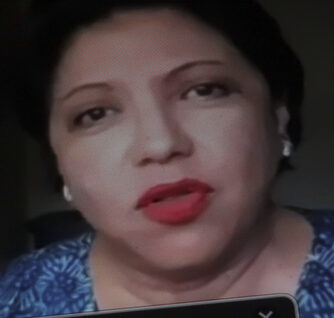 During the Zoom session, Rebecca Aguilar (pictured), president of the Society of Professional Journalists, took to Twitter: “The conversation turned to salaries of TV news people. I said it’s sucked & it needs to change. Broadcast companies are making MILLIONS and TV producers & reporters are starting at 30K. The excuse of smaller market is an EXCUSE!”
During the Zoom session, Rebecca Aguilar (pictured), president of the Society of Professional Journalists, took to Twitter: “The conversation turned to salaries of TV news people. I said it’s sucked & it needs to change. Broadcast companies are making MILLIONS and TV producers & reporters are starting at 30K. The excuse of smaller market is an EXCUSE!”
There were anecdotes and more anecdotes. Todd Steven Burroughs, an alumnus of the University of Maryland College Park, told the group, “I never forgot going to my alma mater, UMCP, to see the Journalism graduation about five years ago. There were two things I remember: a) There were so many sisters I thought I was at Howard, b) *none* of the Black women were going into journalism.”
Lynne Adrine, who is stepping down as director of the D.C. Graduate Program in Broadcast and Digital Journalism at Syracuse University, said, “I had students who sold plasma with their first job. I’ve had students who worked fast food restaurants and additional side hustles because their salaries just weren’t compensation.”
Rochelle Riley, former Detroit Free Press columnist now working as director of arts and culture for the city of Detroit, declared, “There needs to be something drastic . . . you know we talk in this country about the teacher shortage, and we don’t have enough teachers because of the retirements . . . and we’re acting like that’s not real. We’ve got a real shortage in journalism. . . . I am seeing that here in Michigan. . . . We’re talking young people who could be brilliant future journalists who are not going to do it because they can’t get paid.”
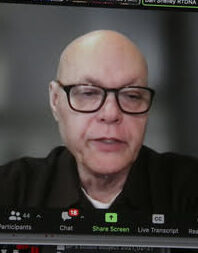 As for the news industry itself, Dan Shelley (pictured), president of the Radio Television Digital News Association, promised change. “Many companies that run local broadcast and digital newsrooms across the country are working actively on this issue,” he reiterated to Journal-isms late last week.
As for the news industry itself, Dan Shelley (pictured), president of the Radio Television Digital News Association, promised change. “Many companies that run local broadcast and digital newsrooms across the country are working actively on this issue,” he reiterated to Journal-isms late last week.
“Some are increasing salaries and benefits and doing other things to retain employees – comments to the contrary made by others during the Roundtable notwithstanding. Is the industry perfect in this regard? No, but most corporate news managers realize that and are working to fix it.”
At the RTDNA conference Sept. 14-16 in Indianapolis, Shelley continued, “we have at least a couple of breakout sessions scheduled that will at least tangentially touch on this topic, probably the more relevant of which is: ‘Battling the Great Resignation: How to Get ’em and Keep ’em.’ ”
It will feature Andrew Heyward, the onetime CBS News president now teaching at the Walter Cronkite School of Journalism and Mass Communication at Arizona State University. Heyward wrote in December for the Knight-Cronkite News Lab at ASU, “The rupturing pipeline for young TV journalists is a major pain point for news directors, and the worsening shortage of new recruits is touching off a snowball or domino effect — pick your metaphor — of stress, burnout and resignations among those who already work in the newsroom.”
 It must be true. Heyward’s piece was cited also by Bob Butler (pictured), former president of the National Association of Black Journalists and current broadcast vice president of the Screen Actors Guild-American Federation of Television and Radio Artists, known as SAG-AFTRA. “That’s where our biggest problem is,” Butler told the group. “It’s the bean counters at these companies . . . . They want to make sure that they take care of their shareholders more than they take care of their employees.”
It must be true. Heyward’s piece was cited also by Bob Butler (pictured), former president of the National Association of Black Journalists and current broadcast vice president of the Screen Actors Guild-American Federation of Television and Radio Artists, known as SAG-AFTRA. “That’s where our biggest problem is,” Butler told the group. “It’s the bean counters at these companies . . . . They want to make sure that they take care of their shareholders more than they take care of their employees.”
This Journal-isms Roundtable took place July 19, with 48 people on the Zoom call, and, as of Sunday, an additional 117 watching on Facebook. It was inspired by a June 13 first-person essay by Carrington J. Tatum, 24, headlined, “Loans got me into journalism. Student debt pushed me out: My degree was more expensive than my wealthier classmates’ degrees because I couldn’t afford to pay in cash.”
 Tatum (pictured) wrote the story for MLK50: Justice Through Journalism, a nonprofit newsroom focused on poverty, power and policy in Memphis. Its founder, Wendi C. Thomas, accompanied Tatum’s with her own piece, “When student loans and the housing crisis force journalists out of the business.”
Tatum (pictured) wrote the story for MLK50: Justice Through Journalism, a nonprofit newsroom focused on poverty, power and policy in Memphis. Its founder, Wendi C. Thomas, accompanied Tatum’s with her own piece, “When student loans and the housing crisis force journalists out of the business.”
Both were panelists at the Roundtable, along with Shelley; Butler; Mary E. Cavallaro, chief broadcast officer of SAG-AFTRA’s News & Broadcast Department; and Ashley Harrington, senior adviser to the chief operating officer at Federal Student Aid, U.S. Department of Education. You can watch the Roundtable here. (starts at 6:50)
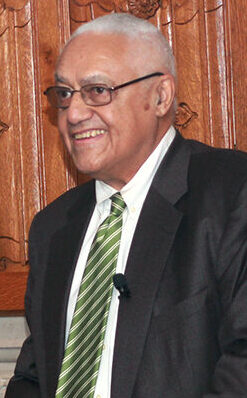 The session opened with a remembrance of Clifford Alexander (pictured), the pioneering lawyer and diversity advocate whose media roles included guiding and representing the Washington Post Metro Seven in their 1972 complaint against the Washington Post before the Equal Employment Opportunity Commission. Alexander also hosted the syndicated “Cliff Alexander: Black on White” in 1973 and 1974, which originated at WJLA-TV in Washington.
The session opened with a remembrance of Clifford Alexander (pictured), the pioneering lawyer and diversity advocate whose media roles included guiding and representing the Washington Post Metro Seven in their 1972 complaint against the Washington Post before the Equal Employment Opportunity Commission. Alexander also hosted the syndicated “Cliff Alexander: Black on White” in 1973 and 1974, which originated at WJLA-TV in Washington.
Alexander died July 3 at 88. All members of the Metro Seven were represented at the Roundtable, with Karen Hodge Thomas standing in for her late brother, Mike Hodge.
Longtime D.C. anchor Maureen Bunyan, who led the remembrance, said Alexander “worked to help change, especially television . . . the attitude of the owners and the managers of TV, radio and newspaper operations. He went into their offices to talk to them; he didn’t write notes. He didn’t threaten, he just told them what the truth was . . . . He said the truth was we belong in these places, and without us, and without Cliff’s work, a lot of us wouldn’t have jobs today, much less have any influence over the life and politics of the United States.” Bunyan included herself among those Alexander helped.
Alexander and high-powered lawyer Robert Barnett “walked into the offices of the management at Channel 9, and said in no uncertain terms, you will not treat this woman the way you have said. . . . And here is how you’re going to do it. And they did it.”
Bunyan was joined by Wally Ashby, who directed “Cliff Alexander: Black on White,” which debuted when “Black public affairs shows were finally getting their due. . . . I learned from Cliff that the most important thing that you can do in life is to share your success and help someone else.”
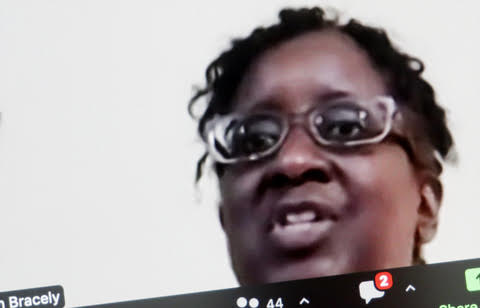 Next, Dawn Bracely (pictured), editorial writer at the Buffalo News, described the pain the city is feeling since the May 14 shooting in Buffalo’s Black community that left 10 people dead.
Next, Dawn Bracely (pictured), editorial writer at the Buffalo News, described the pain the city is feeling since the May 14 shooting in Buffalo’s Black community that left 10 people dead.
“We need to pay attention to promises made to make sure that promises are kept, that that community, which is a poor community, is being lifted up . . . with a social safety net, with job training, educational opportunities,” Bracely said. “We need to make sure that there’s follow-through.”
Tatum delivered the news that he has returned to the Dallas Morning News as a business analyst. But he said his student loan debt situation is still top of mind.
He urged that journalists share salary information so that everyone is on the same page. “If you go back and read it,” he said, referring to his essay, “I gave the exact numbers about my salary . . . specific numbers of my debt . . . because what I found” in talking “to folks about this problem is that, you know, everybody thought they understood.
“They thought they knew. . . . what student debt looks like.”
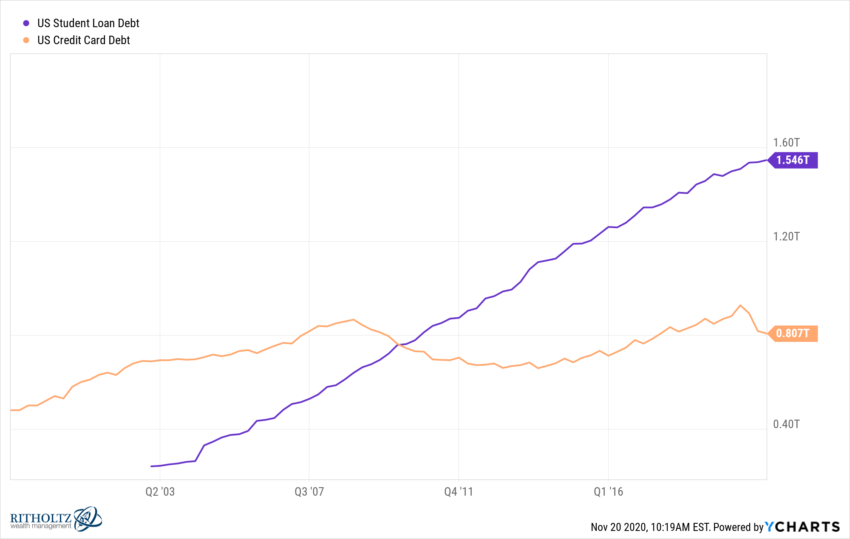
In the United States, “student loans outstanding passed credit card debt in 2010 and hasn’t looked back since,” according to the website A Wealth of Common Sense.
And, as the new Black-oriented Capital B has reported, “Black Americans owe a disproportionate amount of the $1.7 trillion in national student loan debt.”
Ingrid Sturgis, who chairs the Department of Media, Journalism and Film at historically Black Howard University, told the group that Carrington’s is “so much the story of many of my students.”
Corey Washington, who launched his BLKNewsNow.com blog on July 1, said, “The managers consider how much the candidate is worth based on the budget and too often, Black journalists, including myself, in large markets, would get lowballed because they feel they can find another Black person to take your spot if they need diversity.”
There was no shortage of suggested remedies.
 Representing the federal government, Harrington (pictured) pointed to MLK50’s nonprofit status. She told Thomas, “We’ve now forgiven over 8 billion dollars for 144,000 borrowers. You get forgiveness after 10 years or 120 qualifying payments [if] you work at government agencies or nonprofits.
Representing the federal government, Harrington (pictured) pointed to MLK50’s nonprofit status. She told Thomas, “We’ve now forgiven over 8 billion dollars for 144,000 borrowers. You get forgiveness after 10 years or 120 qualifying payments [if] you work at government agencies or nonprofits.
“There are other programs for for-profit operations. We have so many initiatives, and our goal is really to make the system work better and to make higher education more affordable overall,” Harrington said.
“This administration has really prioritized fixing that. Before this administration, only 7,000 people had gotten forgiveness, and now we’re at over 144,000, and it’s because we have this limited waiver going on right now. So if you know people with public — with student loans, and who are in public service, which is government nonprofit,
you should tell them, because they have until Oct. 31 to take advantage of this waiver.
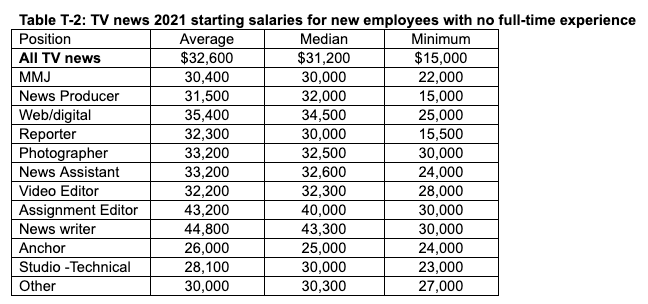
Courtesy: RTDNA/Newhouse School at Syracuse University Annual Survey)
“And it’s a big deal. It’s a game changer. I’ve only been in department since August, but I’ve been working with student loans for a while and this is game changing. They don’t look. They don’t ask . . . about your income, they don’t ask about what you do there. They just want to know where you work. . . .
“The other thing is we’re trying to make it easier in general, for everyone, not just in public service, to manage their loans. And so we’re looking at how we improve income-based repayment and we’re making sure people know they have options, right?
“There are four different income-based payment plans. They each calculate your payment differently in a different percentage. So you can use the tools on our website to figure out which one makes the most sense. (For more detail, Harrington’s comments are at 00:44:21.000 in the video.)
Other suggestions were aimed at the media companies, the schools and the journalists.
Should media outlets consider that the working conditions, in addition to the low pay, are driving away employees? The days when a wealth of grateful applicants was available at low pay are gone.
“They are working ridiculous hours and they’re working around-the-clock schedules because they may be working the traffic report for the early morning show,” Adrine said. “So that means they go in at 2 in the morning or 3 in the morning, to be on the 4:30 newscast, or something like that. And they have those assignments for maybe more than a year.”
Should market size continue to determine salaries? “I don’t think there’s a lot of other industries that have this ladder of compensation based on the market size,” said Cavallaro of SAG-AFTRA.
How about a signing bonus, or an agreement to help pay off loan debt as part of the compensation package?
For their part, a few schools are dropping tuition. At Harvard, “Families with annual incomes of $75,000 or less do not pay anything toward the cost of a Harvard College education.”
Others, such as American University, are teaming with local news outlets to establish fellowships. Early-career journalists earn a master’s degree at AU’s School of Communication while working on the Metro staff of The Washington Post, Amy Eisman, director of the school’s Journalism Division, alerted the group.
And, as many said, the journalists themselves need to be bolder.
“Simple solution. Fight for more money or do not be afraid to walk,” said Aguilar. Referring to multimedia journalists, also called “backpack journalists” or “one-man bands,” Aguilar said, “Producers and MMJs are doing the job of three other people. They deserve those salaries too.”
Riley added, “I had this conversation with an editor who was not Black.
“There was a lawsuit filed in the Detroit Free Press newsroom by women who said they were underpaid compared to males, and he and I talked about it, and he said, ‘Well, women don’t ask for raises. White males come in every . . . month, every three months, and ask for a bump.
“But you can have people who are working in the newsroom 10 years and never asked for a raise.
“So I think that one of the things we do have to do is to give these young people some life lessons while we’re giving them journalism and history lessons.
“I seriously am very concerned about what’s going to happen not just with — well, what’s happening with teaching, what’s happening with journalism, but [with] the fact that all of that will affect how we are viewed, not just in the history books, but in our daily lives. We literally are not going to have people to write any types of truth because we won’t have any people in the newsroom . . . we won’t have any people in the classrooms.”
- Leah Asmelash, CNN: University of California system will waive tuition for Native American students (April 26)
- Andrew Heyward, Knight-Cronkite News Lab: The Local Newsroom Recruitment Crisis, Part 1 (Dec. 30, 2021)
- Andrew Heyward, Knight-Cronkite News Lab: The Local Newsroom Recruitment Crisis, Part 2 (Dec. 21, 2021)
- Zolan Kanno-Youngs, Jim Tankersley and Stacy Cowley, New York Times: Inflation Complicates Biden’s Deliberations on Student Loan Forgiveness (June 22)
- Journal-isms Roundtables
- Colbert I. King, Washington Post: Clifford Alexander’s fight remains unfinished (July 8)
- Ayelet Sheffey, Business Insider: Delaware State University will use Biden’s stimulus to cancel over $700,000 in student debt (May 14, 2021)
‘[btnsx id=”5768″]
To subscribe at no cost, please send an email to journal-isms+subscribe@groups.io and say who you are.
Facebook users: “Like” “Richard Prince’s Journal-isms” on Facebook.
Follow Richard Prince on Twitter @princeeditor
Richard Prince’s Journal-isms originates from Washington. It began in print before most of us knew what the internet was, and it would like to be referred to as a “column.” Any views expressed in the column are those of the person or organization quoted and not those of any other entity. Send tips, comments and concerns to Richard Prince at journal-isms+owner@
View previous columns (after Feb. 13, 2016).
View previous columns (before Feb. 13, 2016)
-
-
- Diversity’s Greatest Hits, 2018 (Jan. 4, 2019)
- Book Notes: Is Taking a Knee Really All That? (Dec. 20, 2018)
- Book Notes: Challenging ’45’ and Proudly Telling the Story (Dec. 18, 2018)
- Book Notes: Get Down With the Legends! (Dec. 11, 2018)
- Journalist Richard Prince w/Joe Madison (Sirius XM, April 18, 2018) (podcast)
- Richard Prince (journalist) (Wikipedia entry)
- February 2018 Podcast: Richard “Dick” Prince on the need for newsroom diversity (Gabriel Greschler, Student Press Law Center, Feb. 26, 2018)
- Diversity’s Greatest Hits, 2017 — Where Will They Take Us in the Year Ahead?
- Book Notes: Best Sellers, Uncovered Treasures, Overlooked History (Dec. 19, 2017)
- An advocate for diversity in the media is still pressing for representation, (Courtland Milloy, Washington Post, Nov. 28, 2017)
- Morgan Global Journalism Review: Journal-isms Journeys On (Aug. 31, 2017)
- Diversity’s Greatest Hits, 2016
- Book Notes: 16 Writers Dish About ‘Chelle,’ the First Lady
- Book Notes: From Coretta to Barack, and in Search of the Godfather
- Journal-isms’ Richard Prince Wants Your Ideas (FishbowlDC, Feb. 26, 2016)
- “JOURNAL-ISMS” IS LATEST TO BEAR BRUNT OF INDUSTRY’S ECONOMIC WOES (Feb. 19, 2016)
- Richard Prince with Charlayne Hunter-Gault, “PBS NewsHour,” “What stagnant diversity means for America’s newsrooms” (Dec. 15, 2015)
- Book Notes: Journalists Follow Their Passions
- Book Notes: Journalists Who Rocked Their World
- Book Notes: Hands Up! Read This!
- Book Notes: New Cosby Bio Looks Like a Best-Seller
- Journo-diversity advocate turns attention to Ezra Klein project (Erik Wemple, Washington Post, March 5, 2014)
-
When you shop @AmazonSmile, Amazon will make a donation to Journal-Isms Inc. https://t.co/OFkE3Gu0eK
— Richard Prince (@princeeditor) March 16, 2018
Page views: 352 on Aug. 18, 2022
![]()

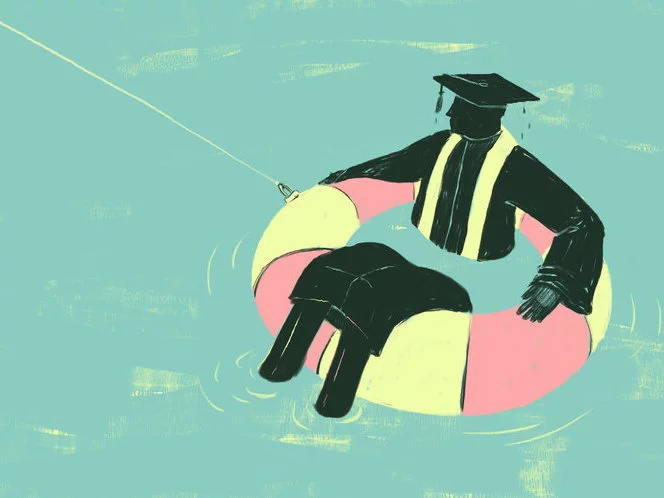
1 comment